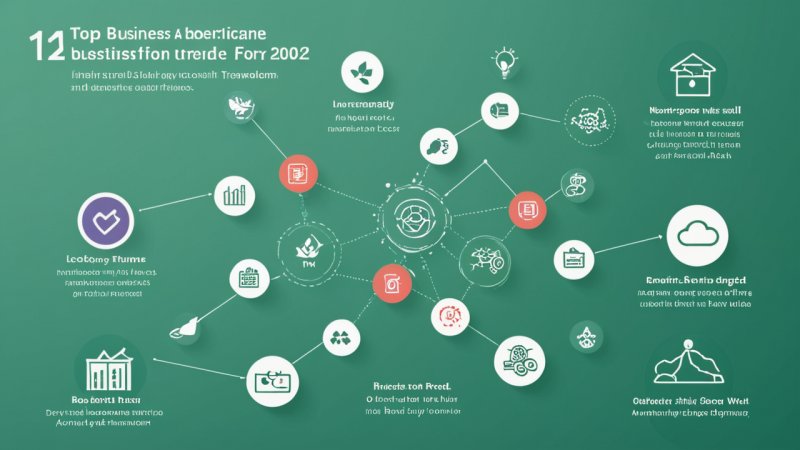The landscape of business and economics is constantly evolving, driven by technological advancements, shifting consumer behaviors, and global events. As we approach 2024, understanding the key trends and economic theories that will shape the business environment is crucial for professionals, academics, and enthusiasts alike. This article delves into the most significant business trends anticipated for 2024, explores contemporary economic theories that underlie these trends, and provides insights into how organizations can navigate the complexities of a rapidly changing marketplace.
Emerging Business Trends for 2024
Several business trends are gaining momentum as we move into 2024, impacting various sectors and influencing how organizations operate.
1. Sustainability and Corporate Responsibility
Businesses are increasingly prioritizing sustainability, not just as a moral imperative but as a strategy for long-term success. In 2024, we can expect to see more companies integrating sustainability into their core operations, focusing on reducing carbon footprints, implementing circular economy principles, and investing in renewable energy. This shift is driven by consumer demand for eco-friendly products and practices, as well as regulatory pressures.
2. Digital Transformation
The digital transformation trend is poised to accelerate in 2024, fueled by advancements in artificial intelligence (AI), machine learning, and the Internet of Things (IoT). Businesses are leveraging these technologies to enhance operational efficiency, improve customer experience, and create innovative products and services. Companies that embrace digital tools will likely gain a competitive edge in their respective industries.
3. Remote and Hybrid Work Models
The COVID-19 pandemic catalyzed a significant shift towards remote and hybrid work models, a trend that will continue to evolve in 2024. Organizations are recognizing the benefits of flexible work arrangements, which can lead to increased employee satisfaction and productivity. As a result, companies will need to invest in technology and infrastructure that supports remote collaboration and communication.
4. Data-Driven Decision Making
In an age of information overload, data-driven decision-making is becoming essential for business success. In 2024, organizations will increasingly rely on data analytics to inform their strategies, understand consumer behaviors, and optimize operations. This trend underscores the importance of data literacy among employees at all levels.
5. Health and Wellbeing in the Workplace
Employee wellbeing is gaining recognition as a core element of organizational success. In 2024, businesses will prioritize mental and physical health initiatives, providing resources and support to enhance employee wellbeing. This trend not only fosters a positive work environment but also contributes to higher retention rates and improved performance.
Key Economic Theories Impacting Business Trends
Understanding the economic theories that underpin these business trends is essential for comprehending the broader implications of changes in the marketplace.
1. Behavioral Economics
Behavioral economics examines how psychological factors influence economic decision-making. As businesses navigate complex consumer preferences in 2024, insights from behavioral economics will be invaluable. Companies can utilize these insights to tailor marketing strategies, enhance customer engagement, and design products that resonate with their target audiences.
2. Circular Economy
The circular economy model promotes sustainability by encouraging the reuse, recycling, and repurposing of resources. This theory is gaining traction as businesses recognize the economic benefits of minimizing waste and optimizing resource use. In 2024, organizations adopting circular economy principles will not only reduce their environmental impact but also uncover new revenue streams.
3. Innovation Economics
Innovation economics emphasizes the role of innovation in driving economic growth. As we enter 2024, businesses that foster a culture of innovation will be better positioned to compete in a rapidly changing market. This theory highlights the importance of research and development investments, collaboration, and agility in responding to market demands.
4. Globalization and Trade Theories
Globalization continues to shape business dynamics, influencing trade patterns and market access. In 2024, economic theories related to trade, such as comparative advantage and trade liberalization, will be critical for businesses looking to expand their reach internationally. Understanding global market trends and geopolitical factors will be essential for strategic decision-making.
5. The Gig Economy and Labor Market Theories
The rise of the gig economy reflects changing labor market dynamics and consumer preferences. Economic theories related to labor markets will inform how businesses approach workforce management, talent acquisition, and employee engagement in 2024. Organizations will need to adapt to the preferences of gig workers and consider flexible employment models.
Adapting to Change: Strategies for Businesses
As businesses navigate these trends and economic theories in 2024, several strategies can enhance their adaptability and resilience.
1. Embrace Technology
Investing in technology is crucial for staying competitive. Organizations should explore emerging technologies, such as AI and data analytics, to enhance decision-making and streamline operations.
2. Foster a Culture of Innovation
Encouraging creativity and innovation within the workforce can drive business growth. Companies should create an environment where employees feel empowered to share ideas and experiment with new approaches.
3. Prioritize Sustainability
Integrating sustainability into corporate strategy is no longer optional. Businesses must adopt sustainable practices that align with consumer expectations and regulatory requirements.
4. Invest in Employee Wellbeing
Supporting employee health and wellbeing will lead to a more engaged and productive workforce. Companies should implement programs that address mental and physical health, fostering a positive workplace culture.
5. Stay Informed and Agile
Staying informed about market trends, consumer behaviors, and economic developments is essential for making informed business decisions. Organizations should remain agile, adapting to changes in the environment and seizing new opportunities.
Conclusion
As we look ahead to 2024, the intersection of emerging business trends and economic theories presents both challenges and opportunities for organizations. By embracing sustainability, leveraging technology, and fostering a culture of innovation, businesses can effectively navigate the complexities of the modern marketplace. Understanding the underlying economic theories will provide valuable insights into consumer behaviors and market dynamics, enabling organizations to make informed strategic decisions. Ultimately, the businesses that adapt to these trends and embrace change will be well-positioned for success in the evolving economic landscape.






